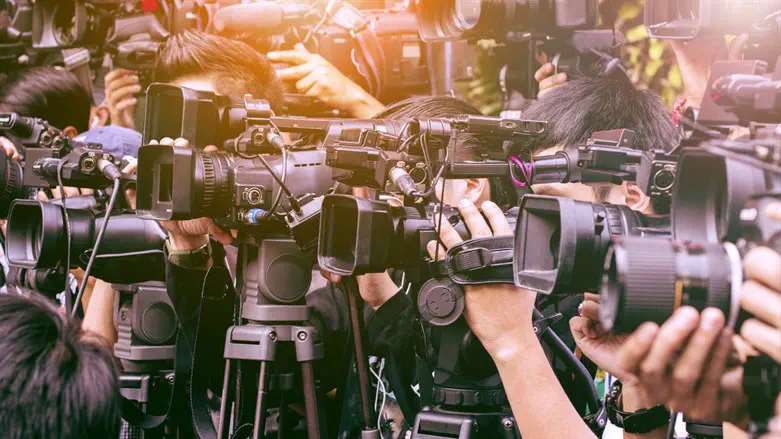
It’s become a familiar refrain: The IDF denies claims from the Hamas-run Gaza Health Ministry, and much of the world shrugs — after all, there are no foreign journalists in Gaza providing neutral, professional, on-the-ground reporting.
And so, the question arises again and again: Why doesn’t Israel allow foreign reporters into Gaza?
It’s a fair question. at least it sounds fair. Below, I present two alternative reasons that may answer the question. Before that, we must consider this:
Where would these journalists stay?
War correspondents generally lodge in hotels. Are any still operational in Gaza? If yes, fine - reporting might be feasible. If not - as is likely the case -- the only remaining options would be to embed with one of three entities:
- The IDF
- Hamas
- A still-functioning NGO, such as UNRWA — which, in light of overwhelming evidence, is effectively a Hamas affiliate.
Now let us look at the implications.
Reason One: The Journalist as Liability
Israel is engaged in a complex urban war against a terrorist organization that tunnels under civilian homes, booby-traps buildings, and fires from hospitals and schools. In this environment, foreign journalists would not merely be vulnerable — they would be a tactical liability.
The IDF cannot ensure the safety of embedded journalists in active combat zones without compromising its own operations. Is the demand for “real-time access” a journalistic right even under such conditions?
Moreover, Hamas has a long and well-documented history of using foreign nationals — especially journalists — as leverage. If a foreign reporter were kidnapped, Hamas would exploit the situation to generate pressure on Israel to halt or delay military operations. The world would blame Hamas for a day, then turn on Israel. We’ve seen this script before.
When journalists embed with Hamas or its affiliated institutions, the risk they take is high. If they are killed in crossfire, Israel will be accused of targeting them — not because evidence demands it, but because the narrative already exists.
In past conflicts, foreign journalists in Gaza have reported being threatened or censored by Hamas, rendering their “independent” status moot.
Finally, there is the matter of operational security. No responsible military — Israeli or otherwise — allows independent journalists to operate freely on an active battlefield, where even an innocuous image or sentence can reveal troop movements, tactics, or vulnerable positions. This is not censorship; it is common sense.
In short, one possible reason why Israel does not permit foreign journalists into Gaza is because the risks — to the journalists, to the troops, and to the broader war effort — are both extreme and asymmetrical. In today’s media environment, moreover, that is not just unfair - it is suicidal.
Reason Two: The Journalist as Threat
Of course, Israel’s critics prefer another explanation.
They argue that the only reason Israel blocks access is because it has something to hide. The IDF, they say, wants to operate in secret — free from the scrutiny of neutral observers who might expose wrongdoing or war crimes.
It’s a theory that absolves Hamas of all responsibility, ignores the impossibility of true “neutrality” under terrorist surveillance, and pretends as though real-time satellite imagery, drone footage, border reporting, and post-conflict investigations don’t exist.
This narrative treats the absence of foreign media as evidence of guilt — as if Hamas’s own brutal record of repression, manipulation, and psychological warfare has nothing to do with it.
It also assumes that Israel, uniquely among democracies, must permit full and unfettered media access in the middle of an existential war. The same critics would never demand that the U.S. embed foreign reporters in the middle of a firefight with ISIS in Syria or Iraq, or expect Ukraine to accommodate independent journalists in an active trench on the Donbas front. Globally, war zones routinely restrict journalists’ frontline access due to safety and operational concerns — as documented by the Committee to Protect Journalists and other watchdogs.
And yet when it comes to Israel, basic wartime discretion is treated as obstruction — or worse, conspiracy.
So, why doesn’t Israel allow foreign journalists into Gaza?
If only there were more foreign journalists in Gaza, the argument goes, the truth would come out—and Israel would be exposed for the monstrous regime it is.
But Gaza is not a conventional war zone. It is an asymmetric battlefield ruled by a terrorist organization that targets civilians, fakes statistics, censors reporters, and uses hostages as human shields.
Any journalist granted access would either become a pawn in Hamas’s propaganda war, a liability to the IDF, or both.
Ultimately, we’re left with a paradox. Israel is damned if it does, and damned if it doesn’t.
Sheri Ozis a jounalist and writer whose articles have appeared on Arutz Sheva, JPost,TOI, Haaretz, JPress and more. Website: Israel Diaries / Substack Writings
